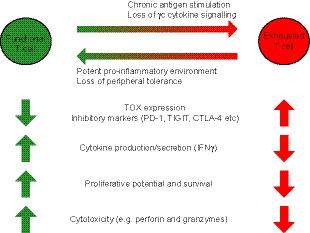当前位置:
X-MOL 学术
›
Immunol. Cell Biol.
›
论文详情
Our official English website, www.x-mol.net, welcomes your feedback! (Note: you will need to create a separate account there.)
Harnessing CD8+ T‐cell exhaustion to treat type 1 diabetes
Immunology and Cell Biology ( IF 4 ) Pub Date : 2021-02-06 , DOI: 10.1111/imcb.12444 Chun-Ting J Kwong 1, 2 , Claudia Selck 1, 2 , Krisna Tahija 1, 2 , Lachlan J McAnaney 1, 2 , Dan V Le 1, 2 , Thomas Wh Kay 1, 2 , Helen E Thomas 1, 2 , Balasubramanian Krishnamurthy 1, 2
Immunology and Cell Biology ( IF 4 ) Pub Date : 2021-02-06 , DOI: 10.1111/imcb.12444 Chun-Ting J Kwong 1, 2 , Claudia Selck 1, 2 , Krisna Tahija 1, 2 , Lachlan J McAnaney 1, 2 , Dan V Le 1, 2 , Thomas Wh Kay 1, 2 , Helen E Thomas 1, 2 , Balasubramanian Krishnamurthy 1, 2
Affiliation

|
Although immune interventions have shown great promise in type 1 diabetes mellitus (T1D) clinical trials, none are yet in routine clinical use or able to achieve insulin independence in patients. In addition to this, the principles of T1D treatment remain essentially unchanged since the isolation of insulin, almost a century ago. T1D is characterized by insulin deficiency as a result of destruction of insulin‐producing beta cells mediated by autoreactive T cells. Therapies that target beta‐cell antigen‐specific T cells are needed to prevent T1D. CD8+ T‐cell exhaustion is an emerging area of research in chronic infection, cancer immunotherapy, and more recently, autoimmunity. Recent data suggest that exhausted T‐cell populations are associated with improved markers of T1D. T‐cell exhaustion is both characterized and mediated by inhibitory receptors. This review aims to identify which inhibitory receptors may prove useful to induce T‐cell exhaustion to treat T1D and identify limitations and gaps in the current literature.
中文翻译:

利用 CD8+ T 细胞耗竭治疗 1 型糖尿病
尽管免疫干预在 1 型糖尿病 (T1D) 临床试验中显示出巨大的希望,但尚无常规临床使用或能够在患者中实现胰岛素独立性。除此之外,自胰岛素分离以来,T1D 治疗的原则基本保持不变,近一个世纪前。T1D 的特征是胰岛素缺乏,这是由自身反应性 T 细胞介导的产生胰岛素的 β 细胞破坏所致。需要针对 β 细胞抗原特异性 T 细胞的疗法来预防 T1D。CD8 +T 细胞耗竭是慢性感染、癌症免疫疗法以及最近的自身免疫研究的一个新兴领域。最近的数据表明,耗尽的 T 细胞群与改善的 T1D 标志物有关。T 细胞耗竭的特征是抑制性受体,并由抑制性受体介导。本综述旨在确定哪些抑制性受体可能有助于诱导 T 细胞耗竭以治疗 T1D,并确定当前文献中的局限性和空白。
更新日期:2021-02-06
中文翻译:

利用 CD8+ T 细胞耗竭治疗 1 型糖尿病
尽管免疫干预在 1 型糖尿病 (T1D) 临床试验中显示出巨大的希望,但尚无常规临床使用或能够在患者中实现胰岛素独立性。除此之外,自胰岛素分离以来,T1D 治疗的原则基本保持不变,近一个世纪前。T1D 的特征是胰岛素缺乏,这是由自身反应性 T 细胞介导的产生胰岛素的 β 细胞破坏所致。需要针对 β 细胞抗原特异性 T 细胞的疗法来预防 T1D。CD8 +T 细胞耗竭是慢性感染、癌症免疫疗法以及最近的自身免疫研究的一个新兴领域。最近的数据表明,耗尽的 T 细胞群与改善的 T1D 标志物有关。T 细胞耗竭的特征是抑制性受体,并由抑制性受体介导。本综述旨在确定哪些抑制性受体可能有助于诱导 T 细胞耗竭以治疗 T1D,并确定当前文献中的局限性和空白。



























 京公网安备 11010802027423号
京公网安备 11010802027423号